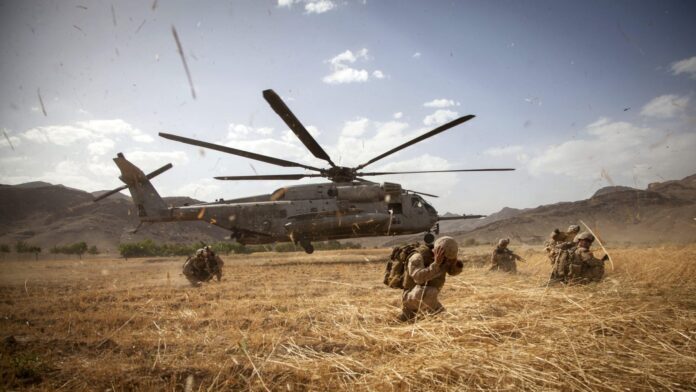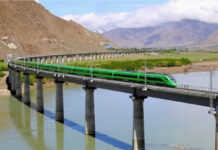Experts believe any increase in terrorist activity in South Asia, home to a quarter of the world’s population and a third of its poor, could have a far-reaching economic impact as millions of dollars will have to be diverted to counter-terrorism in a post-pandemic environment.
By Balaji Subramanian
“The high probability is if American forces withdraw from Afghanistan and if no alternative international arrangement is made that then the historic contests between the regions and the sects will reappear, the Taliban will re-emerge, and a very complicated and maybe chaotic situation will develop.”- Henry Kissinger.
As the United States prepares to leave Afganistan after nearly twenty years, an alliance of terror groups have emerged in this region that could have serious security implications at destabilising peace in South Asia, as reported in Bloombergquient.
After the 9/11 terror attack and the subsequent invasion of Afganistan by the US, this war-ravaged nation has still not experienced peace. Sustained attack by the Taliban and the effective covert support by Pakistan never allowed peace and democracy any chance to grow.
Pakistan has been biding its time for the American troop withdrawal and the Pakistani Army backed militant organisations, such as Lashker-e-Taiba and Jaish-e-Mohammed, the Afghan Taliban, Haqqani network and Islamic State-Khorasan, have increased their attacks on the on Indian assets in Kabul.
The recent attack on a Sikh temple in Kabul, in March, which left 25 dead, gives a clear indication that minorities will not be safe in Afganistan. According to the officials who want to remain unidentified, the Islamic terror alliance is planning to attack other regions in South Asia, including troops in India’s Kashmir.
Former U.S. deputy assistant secretary of state Alyssa Ayres and author of the book Our Time Has Come: How India is Making Its Place in the World said, “The longstanding fear has been that such groups would simply ‘wait out’ the U.S. and international presence and that once the international presence was gone, they would destabilize Afghanistan and the larger region”.
Experts believe any increase in terrorist activity in South Asia, home to a quarter of the world’s population and a third of its poor, could have a far-reaching economic impact as millions of dollars will have to be diverted to counter-terrorism in a post-pandemic environment.
Also, India and Pakistan are nuclear-armed states and any time these two countries get into a confrontation, the whole world seem to hold their breath. Many security experts call Kashmir a “Nuclear flashpoint”.
The Balakot airstrike by the Indian Air Force in 2019, on terror camps operated by the banned Islamic terror group, Jaish-e-Mohammed is one recent example. Pakistan in retaliation launched its fighters to attack Indian military installations and one Indian IAF pilot was captured by them when his Mig-21 fighter jet was shot down.
On February 29 this year the US signed the peace deal with the Taliban in Qatar as per the promise made during the campaign by President Donald Trump, who is seeking a re-election. Many in America felt the war on terror being fought in Afganistan had run its course. The US has already reduced its forces to about 8,000 and handed over some bases to the Afghan government.
Both, the Afghan Government under the leadership of President, Ashraf Ghani and the Taliban agreed to a three-day cease-fire during the upcoming Eid al-Adha festival. But many believe the attacks will soon follow and the cycle of bloodshed will start all over again.
The Taliban claims it wants normal relations with other nations, including India and it must not be treated as a terror organisation. However, they are still maintaining contact with regional and international Islamic terrorist organisations, including al-Qaeda, Islamic State, LeT and others, according to Javid Faisal, the spokesman for Afghanistan’s National Security Council.
Faisal said, “This partnership between these terrorist organizations and the Taliban isn’t just destabilizing Afghanistan or this region, but the entire world,”. They were supposed to cut off their ties to these terrorist groups long ago, they haven’t done yet and they won’t do as they all share the same ideology.”
In April this year, during a counter-terror operation in the Nanghar Province, 14 terrorists belonging to Pakistan-based militant groups and the Taliban were killed.
Before the invasion and the ouster of the Taliban, Afganistan under them was known as the Islamic Emirate of Afghanistan, a totalitarian and puritanical Islamic state established in September 1996 with the help of Pakistan.
The peace deal signed by the US and the Taliban only precludes any attack on American or North Atlantic Treaty Organisation (NATO) forces. However, the Afghan defence forces are a fair game.
Attacks on Afghan defence forces are coordinated with the help of the tie-up. Multiple joint training facilities have also been set up in southern and central Afghanistan to carry out frequent attacks.
Pakistan sees Afghanistan as its sphere of influence and for nearly twenty years, resented Indian presence. India has played a major role in the development of Afghanistan and built roads, dams and highways. India also gave training to the Afghan army and many of its officers received training in our military academy.
It is an open secret that Afghans do not trust Pakistan and the only reason they have to depend upon them is because they are a landlocked country. Import and export of goods have to go through Pakistan which gives them an upper hand. Also, Pakistan has nothing to offer economically as they themselves are a poor nation trapped in debt, but with the help of the Taliban, they want to regain control.
However, this time the dynamics have changed and China wants to develop its Belt and Road Initiative (BRI) along with the China-Pakistan Economic Corridor (CPEC) in Afganistan. Since the Taliban are in a sense an extension of the Pakistan army and treated as its most valuable strategic asset, China is hedging that Pakistan will rein them in.
If China gets access to the roads of Afghanistan, it will have access to the entire central Asia region.
These are serious and long thought out attempts at altering the power dynamics in Afghanistan. A recent report of the United Nations states that nearly 6500 Pakistani Nationals are fighting alongside terrorist groups in Afghanistan.
In May, this year, there were reports that the Taliban was joining Jihad in Kashmir. However, it was immediately disavowed by the Taliban spokesperson Suhail Shaheen who said, “ The statement published in the media about Taliban joining Jihad in Kashmir is wrong…. The policy of the Islamic Emirate is clear that it does not interfere in the internal affairs of other countries.”
However, just as a leopard never changes its spots, any such change wherein India could operate its embassy and consulate in Afganistan unmolested is a far cry. Right now the Taliban may claim that it has no intension of joining Jihad (Holy War) and wage war against India in Kashmir, but history suggests otherwise.
Pakistan hopes to have total hegemony over Afganistan with the help of China which sees this country as an important strategic outlet. Also, Pakistan is not going to end its support to terrorism in Kashmir and China is heavily invested in the Pakistan Occupied Kashmir (PoK) and in the Gilgit-Baltistan region crucial for (CPEC).
Pakistan can claim that after the US troop withdrawal there will not be any increase in violence in Afghanistan or its jihadists directed towards Kashmir.
But everyone knows that the main aim of Pakistan is it to maintain its strategic depth and Keep India out. As far as Kashmir is concerned, it is the cornerstone, the very being of Pakistan as a nation.
Pakistan has abundantly made it clear that it does not desire any security role of India in Afghanistan because India has always played the role of spoiler.
Salman Rushdi said it best, “Pakistan is alarmed by the rising Indian influence in Afghanistan, and fears that an Afghanistan cleansed of the Taliban would be an Indian client state, thus sandwiching Pakistan between two hostile countries. The paranoia of Pakistan about India’s supposed dark machinations should never be underestimated.”
Pakistan said U.S. troop withdrawal won’t lead to an increase of violence in the region, adding that the Kashmir situation was becoming volatile due to its mishandling by India. Prime Minister Narendra Modi’s government scrapped a key status for Jammu and Kashmir state last year and imposed federal rule.
Pakistan’s defence forces media wing in a statement had said, “Trying to link the post-U.S. withdrawal Afghanistan to Kashmir issue is another malicious attempt by India to keep the region in a state of flux. The so-called intelligence reports alleging Pakistan to be following some kind of strategic design are simply baseless and laughable.”
Pakistan may celebrate the defeat of yet another superpower in Afganistan, as the Americans leave after 18 years.
It seems the words, Henry Kissinger was prophetic when he said, “ Taliban will re-emerge, and a very complicated and maybe chaotic situation will develop”.
Balaji Subramanian is a freelance writer who writes in the field of mental health, music and politics. He tweets @LaxmanShriram78








